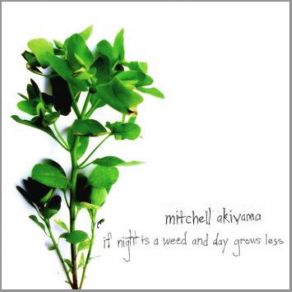If Night Is a Weed and Day Grows Less
Download links and information about If Night Is a Weed and Day Grows Less by Mitchell Akiyama. This album was released in 2004 and it belongs to Ambient, Electronica, Experimental, IDM genres. It contains 8 tracks with total duration of 35:31 minutes.

|
|
|---|---|
| Artist: | Mitchell Akiyama |
| Release date: | 2004 |
| Genre: | Ambient, Electronica, Experimental, IDM |
| Tracks: | 8 |
| Duration: | 35:31 |
| Buy it NOW at: | |
| Buy on Amazon $5.99 | |
| Buy on iTunes $6.99 | |
Tracks
[Edit]| No. | Title | Length |
|---|---|---|
| 1. | Try to Conceal | 5:42 |
| 2. | Enfin rien n'est gagné | 5:27 |
| 3. | With Hope That | 6:06 |
| 4. | A Lesser Path Growing | 2:58 |
| 5. | Il n'y a pas de silence | 3:37 |
| 6. | If Days Wins, Night Could Fail | 4:47 |
| 7. | Fall Away Fall Away | 5:31 |
| 8. | Night Grows Less | 1:23 |
Details
[Edit]Mitchell Akiyama's fourth full-length album is a far cry from his beat-heavy beginnings. In fact, If Night Is a Weed and Day Grows Legs focuses on melody, however treated and mistreated, filtered and deconstructed. It would be easy to present this album as the piano counterpart to Fennesz' guitar-based tunes. But Akiyama's music follows a slightly different vein. Yes, one finds a similar approach to melody and to source filtering, but Akiyama's music is more deeply rooted in the post-rock ethos (with classical leanings), while presenting a harsher, more eccentric use of digital cut-up. Clocking in at barely over 35 minutes, this is a short album, as it leaves little time for the listener to make contact with, get accustomed to, and get a taste of the music. "...Try to Conceal" quickly established Akiyama's fresh sound (also featured in his contribution to the List compilation Instruments). "Enfin, Rien Est Gagné" introduces cellist Beckie Foon — her instrument is the second most important sound source on the album. "With Hope That" is dedicated to Steve Reich, something made obvious by the cyclical repetitions giving it shape. "If Day Wins, Night Could Fail" is the strangest piece, a highly contrasting sequence of frantic cut-ups of delicate melodies — as if Akiyama was switching back and forth between parallel digital tracks, unable to choose his next move. It makes for a disturbing listen, the loveliness of the music being hacked to pieces by the digital edits. For the first time in Akiyama's discography, this album sounds incomplete, as if foretelling a transformation as yet incomplete. ~ François Couture, Rovi